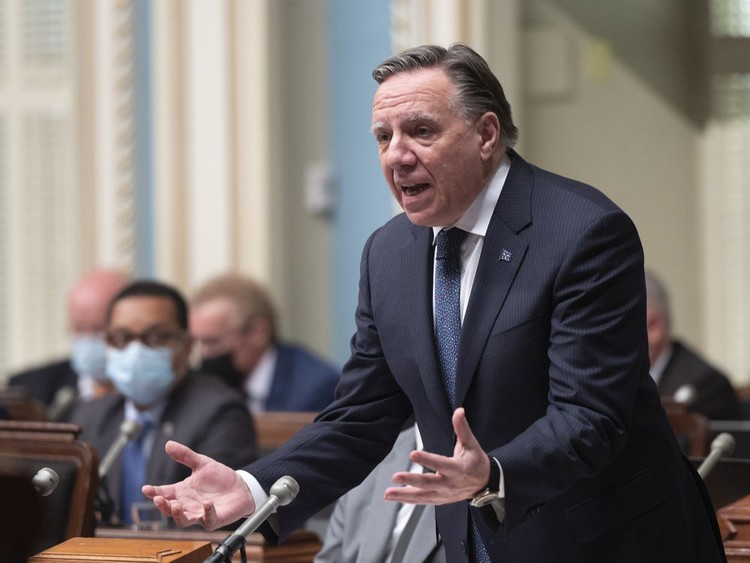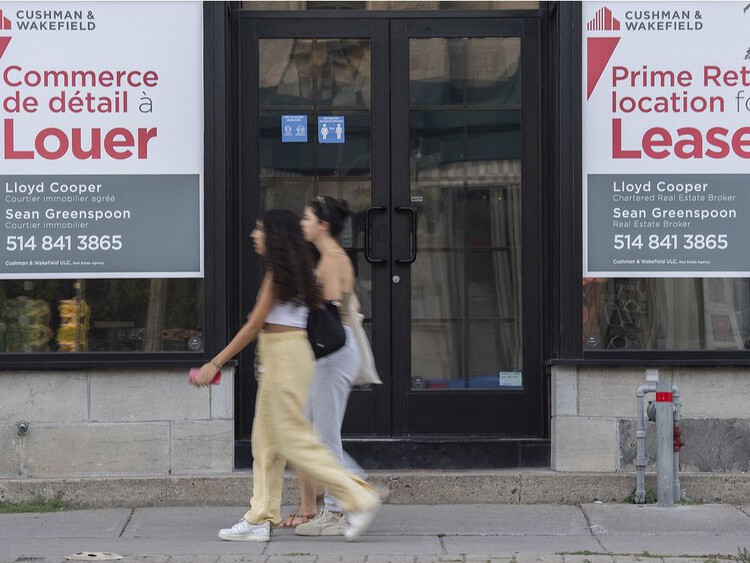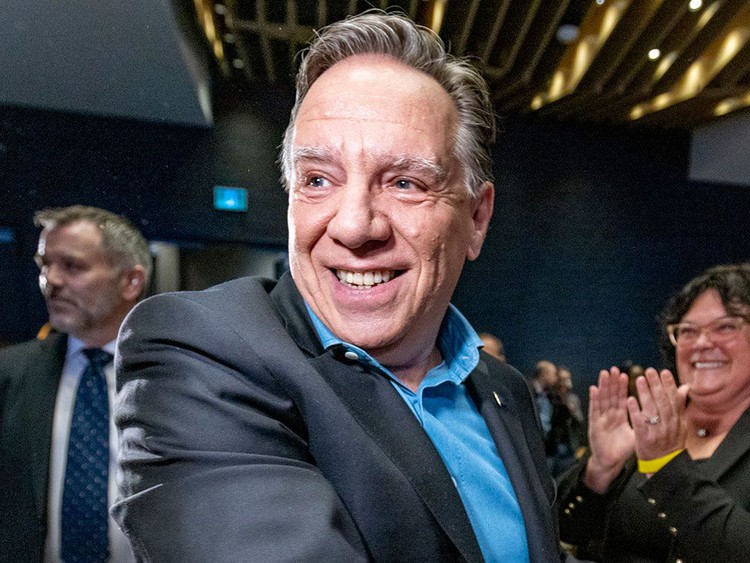Can you think of any other reason why anyone would pick trucks over pipelines to move crude oil?If that's the argument, moving goods by oxcart creates even more jobs than trucks.
Unity & Equalization??
- Thread starter Ron in Regina
- Start date
You are using an out of date browser. It may not display this or other websites correctly.
You should upgrade or use an alternative browser.
You should upgrade or use an alternative browser.
They don't require dedicated, single-purpose pathways (roads have other uses too).Can you think of any other reason why anyone would pick trucks over pipelines to move crude oil?
Far as I'm concerned, pipelines are the best way to transport liquids for which there is a steady, long-term need. And I imagine if and when those liquids are no longer needed, we'll find a way to re-purpose the pipelines. If nothing else, we can use the survey data for the Next Big Thing.
Water.They don't require dedicated, single-purpose pathways (roads have other uses too).
Far as I'm concerned, pipelines are the best way to transport liquids for which there is a steady, long-term need. And I imagine if and when those liquids are no longer needed, we'll find a way to re-purpose the pipelines. If nothing else, we can use the survey data for the Next Big Thing.
Nah, water's totally old school. How bout dihydrogen oxide?Water.
If ozonated it would be allotropic dihydrogen oxide.Nah, water's totally old school. How bout dihydrogen oxide?
When you consider the number of people who've died after inhaling dihydrogen oxide, it's amazing Protecting Morons From Their Own Stupidity Canada hasn't banned it. Or at least slapped a warning label on it.If ozonated it would be allotropic dihydrogen oxide.
And for cattle breeders, carwrights, wheelwrights, carters, liverymen (excuse me, "liverypeople"), feed sellers, and poop-scoopers.Yeah, for oxen.
And let's not forget that given the carrying capacity of the average oxcart, you'll need a whole BUNCH of 'em.
Best part is, if they decide to hold a Freedumb Convoy, most of 'em die of old age before they get to Ottawa. Or at least their oxen will.
Foreigners. What're ya gonna do?There are people who need a PFD to take a sponge bath.
$9.5 Billion to Quebec in Equalization? This is not a current video by any means….
Yeah, no kidding, Rick Mercer off the air for a decade now, eh??
Quebec’s anglophone community rarely protests in the streets against government policy. However, many who came out Saturday said while they are in favour of protecting the French language and culture in Quebec, Bill 96 — which is expected to come to a vote in the National Assembly at the end of the month — would have disastrous consequences in education, language and health-care sectors.
The law would give increased powers to the Office québécois de la langue française, the province’s language watchdog, such as search and seizure without a warrant. It would also restrict service in English in health-care institutions and the courts.

 apple.news
apple.news
The bill has also raised the ire of the province’s Indigenous communities who called it a form of cultural genocide, and asked to be exempted from it, to no avail.
Speaking for the Mohawk community contingent from Kahnawake, Kenneth Deer said the law puts up more barriers in front of Indigenous people.
“The Mohawk language was spoken here thousands of years before French was ever spoken,” Deer said. “We are being recolonized again by the Quebec government because of Bill 96. We don’t force you to learn Mohawk. Don’t force us to learn your language.”
(The protest was peaceful with police escorts at the front and rear of the line of marchers. No need for the Emergencies Act or for Trudeau to flee to the Ukraine or Tofino.)
QUEBEC — Premier François Legault is being heavily criticized for declining an invitation by a consortium of news media to participate in an election debate in English.
And without his participation and that of Parti Québécois Leader Paul St-Pierre Plamondon — who also said he would not join in — organizers announced late Friday they were cancelling the event, which had been scheduled for Sept. 20.

 apple.news
apple.news
The law would give increased powers to the Office québécois de la langue française, the province’s language watchdog, such as search and seizure without a warrant. It would also restrict service in English in health-care institutions and the courts.
Thousands of Montrealers march in opposition to Bill 96 — Montreal Gazette
Many protesters said while they are in favour of protecting the French language and culture in Quebec, Bill 96 would have disastrous consequences in education, language and health-care sectors.
The bill has also raised the ire of the province’s Indigenous communities who called it a form of cultural genocide, and asked to be exempted from it, to no avail.
Speaking for the Mohawk community contingent from Kahnawake, Kenneth Deer said the law puts up more barriers in front of Indigenous people.
“The Mohawk language was spoken here thousands of years before French was ever spoken,” Deer said. “We are being recolonized again by the Quebec government because of Bill 96. We don’t force you to learn Mohawk. Don’t force us to learn your language.”
(The protest was peaceful with police escorts at the front and rear of the line of marchers. No need for the Emergencies Act or for Trudeau to flee to the Ukraine or Tofino.)
QUEBEC — Premier François Legault is being heavily criticized for declining an invitation by a consortium of news media to participate in an election debate in English.
And without his participation and that of Parti Québécois Leader Paul St-Pierre Plamondon — who also said he would not join in — organizers announced late Friday they were cancelling the event, which had been scheduled for Sept. 20.
English leaders' debate axed after snub by Legault and the PQ — Montreal Gazette
News that the premier had declined the invitation spread fast with a mix of disappointment and anger in the anglophone community.
Reconciliation my word .Quebec’s anglophone community rarely protests in the streets against government policy. However, many who came out Saturday said while they are in favour of protecting the French language and culture in Quebec, Bill 96 — which is expected to come to a vote in the National Assembly at the end of the month — would have disastrous consequences in education, language and health-care sectors.
The law would give increased powers to the Office québécois de la langue française, the province’s language watchdog, such as search and seizure without a warrant. It would also restrict service in English in health-care institutions and the courts.

Thousands of Montrealers march in opposition to Bill 96 — Montreal Gazette
Many protesters said while they are in favour of protecting the French language and culture in Quebec, Bill 96 would have disastrous consequences in education, language and health-care sectors.apple.news
The bill has also raised the ire of the province’s Indigenous communities who called it a form of cultural genocide, and asked to be exempted from it, to no avail.
Speaking for the Mohawk community contingent from Kahnawake, Kenneth Deer said the law puts up more barriers in front of Indigenous people.
“The Mohawk language was spoken here thousands of years before French was ever spoken,” Deer said. “We are being recolonized again by the Quebec government because of Bill 96. We don’t force you to learn Mohawk. Don’t force us to learn your language.”
(The protest was peaceful with police escorts at the front and rear of the line of marchers. No need for the Emergencies Act or for Trudeau to flee to the Ukraine or Tofino.)
QUEBEC — Premier François Legault is being heavily criticized for declining an invitation by a consortium of news media to participate in an election debate in English.
And without his participation and that of Parti Québécois Leader Paul St-Pierre Plamondon — who also said he would not join in — organizers announced late Friday they were cancelling the event, which had been scheduled for Sept. 20.

English leaders' debate axed after snub by Legault and the PQ — Montreal Gazette
News that the premier had declined the invitation spread fast with a mix of disappointment and anger in the anglophone community.apple.news
Quebec’s new language law has dozens of municipalities in the province shoring up their bilingual status, with few considering giving up the right to serve their citizens in both English and French.
Almost 90 cities, towns or boroughs in Quebec are considered officially bilingual, a designation allowing them to offer services, post signage and mail communications in the country’s two official languages. Jurisdictions without this status must communicate only in French, with few exceptions.
Bill 96, the new language law that came into effect June 1, proposes that a municipality’s bilingual status be revoked in places where fewer than 50 per cent of citizens have English as a mother tongue. However, a bilingual town or city can avoid losing its status by passing a resolution within 120 days of receiving notice from the province.

 apple.news
apple.news
The official purpose of Bill 96 is to affirm that French is Quebec’s ONLY official language and “the common language of the Québec nation.” But four mayors who spoke to the Canadian Press by phone, as well as many of those who responded by email, all said the decision to operate in two languages was unanimous among city council and raised little to no debate among citizens.
“I believe the French language is already protected, and well protected,” said Richard Burcombe, the mayor of Town of Brome Lake, in Quebec’s Eastern Townships. “They don’t need to eliminate services to the English population to protect the French language.”
Almost 90 cities, towns or boroughs in Quebec are considered officially bilingual, a designation allowing them to offer services, post signage and mail communications in the country’s two official languages. Jurisdictions without this status must communicate only in French, with few exceptions.
Bill 96, the new language law that came into effect June 1, proposes that a municipality’s bilingual status be revoked in places where fewer than 50 per cent of citizens have English as a mother tongue. However, a bilingual town or city can avoid losing its status by passing a resolution within 120 days of receiving notice from the province.
Quebec municipalities protecting right to serve residents in English — Montreal Gazette
A town or city with less than 50% of people whose first language is English can keep its bilingual status by passing a resolution, Bill 96 says.
The official purpose of Bill 96 is to affirm that French is Quebec’s ONLY official language and “the common language of the Québec nation.” But four mayors who spoke to the Canadian Press by phone, as well as many of those who responded by email, all said the decision to operate in two languages was unanimous among city council and raised little to no debate among citizens.
“I believe the French language is already protected, and well protected,” said Richard Burcombe, the mayor of Town of Brome Lake, in Quebec’s Eastern Townships. “They don’t need to eliminate services to the English population to protect the French language.”
I really have to wonder if this isn't going to have exactly the opposite effect in the long run. The more you segregate yourself, the more you set yourself up to be segregated against.The official purpose of Bill 96 is to affirm that French is Quebec’s ONLY official language
But the PM has to be bilingual…The deck is stacked not against Quebec who doesn’t have to be bilingual with it’s one official language. I almost hope you’re right.I really have to wonder if this isn't going to have exactly the opposite effect in the long run. The more you segregate yourself, the more you set yourself up to be segregated against.
Well in my experience you can rely on what i call the 3rd law of political motion - for every stupidity there is an equal and opposite stupidity. It just sometimes takes a bit.I almost hope you’re right.
These are certainly interesting times for constitutional norms. Alberta’s and Saskatchewan’s governments are planning to pass bills they say would essentially allow them to ignore any federal law they don’t like. They can’t do that, constitutional experts protest. Premiers Danielle Smith and Scott Moe don’t seem to care.
Ontario’s Progressive Conservative government continues to explore novel uses of the charter’s notwithstanding clause, this time to legislate (or at least threaten to) a four-year contract on CUPE-represented educational workers. That’s not the sort of thing the notwithstanding clause was meant for, constitutional experts insist. And it was never designed to be used preemptively — to shield new legislation from judicial objections, rather than respond to such objections after the fact. Premier Doug Ford doesn’t seem to care.
Meanwhile in Quebec, provincial Justice Minister Simon Jolin-Barrette says the Coalition Avenir Québec government will introduce legislation that would make swearing allegiance to the Canadian monarch optional. Constitutional experts insist (as does common sense) that a province can’t just pass a law that overrides the Constitution, which makes the oath mandatory in no uncertain terms. Premier François Legault definitely doesn’t care.
Still in Quebec: On Wednesday, Christine Fréchette, minister of Immigration, Francization and Integration, gave an interesting answer to a perplexing question. The federal government wants to ramp up immigration to 500,000 people a year. Legault refuses to accept more than 50,000; he wants even more powers over immigration to be transferred from Ottawa, a process that began in 1991 for Quebec and no other province.
If a province currently comprising 22 per cent of the Canadian population only accepts 10 per cent of immigrants to Canada, a reporter noted, it is rapidly going to lose demographic clout in the federation — including in the House of Commons, one might naively assume.
“We’re relying on a commitment from the Canadian prime minister to ensure stable representation of Quebec in the House of Commons,” Fréchette said. “The (federal) opposition parties share this perspective. For us, it’s reassuring.”

 apple.news
apple.news
Worse, and just as pathetic, Fréchette has good reason to believe Ottawa will play ball. The Liberals have committed to not letting Quebec lose even a single seat, despite the mathematical fact that it should in the next redistribution. “Ensuring that Quebec’s number of seats in the House of Commons remains constant” is even part of the Liberals’ supply-and-confidence agreement with the New Democrats.
Well, hey, why not? Representation-by-population in Canada is already a bit of a joke: A vote in Labrador (population 26,655) is worth almost eight times what it’s worth in Edmonton-Wetaskiwin (population 209,431). The largest riding in Ontario, Brampton West, is home to 162,353 people, according to the 2021 census; the smallest, Kenora, is home to 64,261.
Besides, we all know Quebec is special. The rest at the above link.
Ontario’s Progressive Conservative government continues to explore novel uses of the charter’s notwithstanding clause, this time to legislate (or at least threaten to) a four-year contract on CUPE-represented educational workers. That’s not the sort of thing the notwithstanding clause was meant for, constitutional experts insist. And it was never designed to be used preemptively — to shield new legislation from judicial objections, rather than respond to such objections after the fact. Premier Doug Ford doesn’t seem to care.
Meanwhile in Quebec, provincial Justice Minister Simon Jolin-Barrette says the Coalition Avenir Québec government will introduce legislation that would make swearing allegiance to the Canadian monarch optional. Constitutional experts insist (as does common sense) that a province can’t just pass a law that overrides the Constitution, which makes the oath mandatory in no uncertain terms. Premier François Legault definitely doesn’t care.
Still in Quebec: On Wednesday, Christine Fréchette, minister of Immigration, Francization and Integration, gave an interesting answer to a perplexing question. The federal government wants to ramp up immigration to 500,000 people a year. Legault refuses to accept more than 50,000; he wants even more powers over immigration to be transferred from Ottawa, a process that began in 1991 for Quebec and no other province.
If a province currently comprising 22 per cent of the Canadian population only accepts 10 per cent of immigrants to Canada, a reporter noted, it is rapidly going to lose demographic clout in the federation — including in the House of Commons, one might naively assume.
“We’re relying on a commitment from the Canadian prime minister to ensure stable representation of Quebec in the House of Commons,” Fréchette said. “The (federal) opposition parties share this perspective. For us, it’s reassuring.”
Chris Selley: Quebec is counting on special treatment from Ottawa to pursue its xenophobic agenda — National Post
No federal party should want to be seen aiding and abetting Legault's economically damaging plan
Worse, and just as pathetic, Fréchette has good reason to believe Ottawa will play ball. The Liberals have committed to not letting Quebec lose even a single seat, despite the mathematical fact that it should in the next redistribution. “Ensuring that Quebec’s number of seats in the House of Commons remains constant” is even part of the Liberals’ supply-and-confidence agreement with the New Democrats.
Well, hey, why not? Representation-by-population in Canada is already a bit of a joke: A vote in Labrador (population 26,655) is worth almost eight times what it’s worth in Edmonton-Wetaskiwin (population 209,431). The largest riding in Ontario, Brampton West, is home to 162,353 people, according to the 2021 census; the smallest, Kenora, is home to 64,261.
Besides, we all know Quebec is special. The rest at the above link.